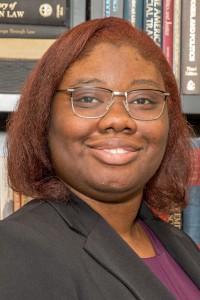'Party Rocking'
Ohio Wesleyan Professor, Former Student Publish Research on Music Preference, Political Attitudes


New research published by Ohio Wesleyan University professor Brianna Mack and 2023 OWU graduate Teresa Martin shows that "even music is political," the authors say.
Their research, "Party rocking: Exploring the relationship between music preference, partisanship, and political attitudes," appears in the February edition of Poetics, an interdisciplinary journal of theoretical and empirical research that explores culture, the media, and the arts.
Reaffirming Identity
"Music preferences are another aspect of identity and people prefer music that shares their worldview and reiterates their sense of self because it reflects the environment they are accustomed to," Mack and Martin state in their paper. "The more closely a person aligns with a political party, the more likely they will listen to music that supports their beliefs and ideology because it reaffirms their identity."
While that finding was expected, said Mack, Ph.D., assistant professor of Politics and Government, she and Martin were surprised by another result.
"While we expected Conservatives and Republicans to prefer country music (we saw a similar trend in the pilot study), we did not expect to see that same genre repel Democrats and Liberals," said Mack, whose research interests include American political behavior, political psychology, and race and ethnicity.
"Neither of us are music scholars," Mack continued, "so we could not identify what is it about country music (if there's something about the lyrics or musical arrangement) that creates that attraction/repellent for Republicans/Democrats, but we believe it boils down to party stereotypes and the demographics and trends that are associated with each party."
Rewarding Research
Regardless of the findings, Martin said, she appreciates the conversation sparked by the project.
"I'm so happy that people are starting to think about the music they listen to in a different light and question what it means about their political views, said Martin, an OWU honors student who majored in Politics and Government and minored in History. "I came up with the idea for this project because I always made that connection for myself, and I thought everyone did in one way or another, so being able to spark that larger conversation feels incredibly rewarding."
Ultimately, Martin hopes to conduct research to determine the order of the relationship between music and politics. In other words, does music preference influence political party preference, or vice versa?
On the way, she plans to explore issues such as party identification within specific artist fandoms – Taylor Swift's Swifties, Beyonce's BeyHive, and Rihanna's Navy, for example – to test the hypothesis that overlap exists between fandom stereotyping and party stereotyping.
"With my music background as an instrumentalist (tenor saxophone, and I played in OWU's Symphonic Wind Ensemble!) and my academic concentration in political psychology, there are countless interactions and research projects that I can explore in the future," Martin said. "Completing this project answered my initial question about the relationship between music and politics, but dozens of other questions appeared that I hope to find answers to."
Currently, Martin is completing a year of service, working with the Mid-Ohio Food Collective through the AmeriCorps VISTA (Volunteers in Service to America) program. In time, she intends to enroll in graduate school to pursue her doctorate in Political Science.
"My goal is to use my degree to help make the world a better place through research," she said, "so ideally that would mean working at a nonprofit and researching in some capacity."
Special Collaborations
The origins of Mack and Martin's new "Party rocking" article date back to fall 2020, when Martin proposed the topic of music preference and partisanship for her final paper for Mack's research methods course.
"I thought it was a very interesting idea," Mack recalled, "because I often wondered if party polarization was seeping into nonpolitical aspects of life like TV show preference and clothing choices, and I enjoy the novelty of pop-culture/politics discussions."
At Mack's urging, Martin met with then-OWU professor Sean Kay, author of the book "Rockin' the Free World!: How the Rock & Roll Revolution Changed America and the World," to obtain his insights and expertise into issues of music and politics.
"Sean was really excited about the topic and encouraged us to consider exploring the project for real," Mack said. When Kay died unexpectedly soon after Martin's meeting, "We both resolved to do the project in his memory," Mack said. Kay's research is referenced in their final Poetics paper, which is dedicated to him.
Martin said the opportunity to work with both OWU professors made the project especially rewarding.
"The most memorable part of the project was working closely with Dr. Mack over the course of three years, as well as completing it in honor of Dr. Sean Kay," she said. "While taking my Conduct of Political Inquiry class where I brainstormed this project, he and I talked for hours about how this kind of research is desperately needed in the political science world, and he strongly encouraged me to pursue it and offered himself as a resource at every twist and turn.
"Despite encouragement from him, Dr. Mack, and countless other professors," Martin said, "I was still very surprised when it was professionally published! I'm incredibly grateful to be published alongside Dr. Mack, and I know that Dr. Kay would be extremely proud of how far this initial class project has come."
Affective Polarization?
For their newly published research, Mack and Martin implemented an online survey that collected 588 responses in fall 2022. The survey was designed to test three hypotheses:
- A respondent who has Old or New Country as their preferred genre of music will be more likely to identify with the Republican Party.
- A respondent who has Pop or Rap/Hip-Hop as their preferred genre of music will be more likely to identify with the Democratic Party.
- Democrat respondents will be more likely to identify more music genres as "American Music" than Republican respondents.
While not all of their hypotheses proved true, Mack and Martin share in their paper's conclusion: "Our findings show that there is a relationship between party identification and genres of music, and affective polarization may be the cause of said relationship.
"Music preferences are connected to political ideology due to the strong emotional responses evoked in the individual, whether because the music they listen to reiterates their political beliefs, or because their political preferences are discussed and confirmed with the type of music they favor."
Read Mack and Martin's complete "Party rocking" paper online at ScienceDirect.com.
